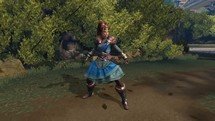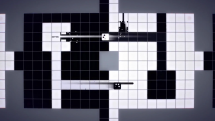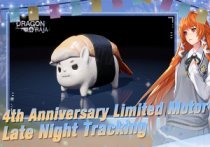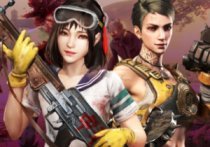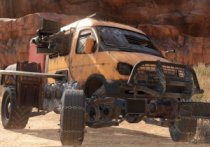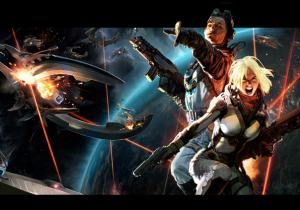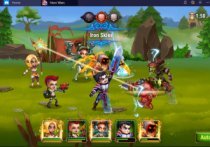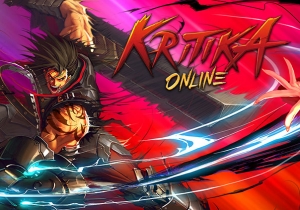Kritika Online – First Look
Some time ago, I did a first impressions video for Kritika Online after En Masse invited me to a press event for the game. Kritika is now in open beta, so its time I did a deep dive to see how the game holds up.
For those who don’t know, Kritika Online is an Arcade-style beat-em-up MMORPG. It focuses its gameplay around shorter stages with big boss-fights and massive combos. As in games like Devil May Cry, the game awards grades at the end of each stage based on your skill with the combo system and how often you took damage or died. Players receive a bonus piece of loot based on their grade. From there you head back to the hub world, turn in quests and grab new ones, and then head back out into the Danger Zone. The NPC interactions amount to very little outside of acquiring quests. They only serve to add a little bit of flavor text and a whole lot of fanservice to the spaces between punching things. This isn’t necessarily a bad thing; games in the past have done well with a whole lot less between the stages.
The customization is lacking as well. Kritika only lets you pick from a handful of faces and hairstyles for character creation. You can change the colors of your clothes, but that’s it. The only way to change your looks is to buy outfits, but more on that later.
The real fun of this game comes from grabbing your favorite character, teaming with your friends, and trying to get S rank or better on stages on Insane difficulty. It’s a challenge and it feels good to get right. The longer I went in a boss fight without taking damage, the better the experience began to feel. The stages themselves are short, but the boss fights serve to flesh out the average runtime. This gives Kritika a more drop-in and drop-out feeling. It’s a game that you can pick up, play for a bit, then come back to it later. You can play marathon sessions too, but the Rest Point system changes how those sessions work.
Each character you create in Kritika has a rest meter. When your meter is at its highest, you get a 1000 percent bonus to XP and item drops. On the second tier, this lowers to 500 percent. On the lowest tier, you get the base amounts. Rest points drop every time you enter a stage. There are a few stages in the game that don’t use Rest Points, but those stages don’t get bonuses from having full RP. Rest points recover when you’re logged out of that character. Rather than forcing you to stop playing the game after a certain period, this instead encourages you to make alternate characters of different classes. Once one character’s rest points drop to the lowest tier, you can switch to another to let them recover. This allows you to try all the different characters and subclasses the game offers.
Kritika has four base characters you can choose to start with. Each has their own playstyle. I covered warriors exclusively in the first impressions video, so I’m going to focus on the other three. Rogues wield two daggers and have a lot of dashing moves. As a base class, they live and die on their mobility. Their kit includes knock-ups and leaping follow-up attacks. Of the four, the rogue was one of my two favorites. Rogues are a mana-hungry class though. If you’re playing one, make sure you take advantage of MP barrels scattered through stages. You’ll also want to make sure you stock up on potions often. They can be huge lifesavers.
The Gunmage is my least favorite class. They use a lot of ranged attacks and big area-of-effect spells. Their moves are cool from a visual standpoint, but the flow of their combos stalls out from having to aim AOE spells and left them feeling disjointed. The Gunmage also has some of the longest cooldowns of the four base classes. This makes finding bread-and-butter combos for them is less like a fighting game and more like playing whack-a-mole with the hot-bar. In short, I didn’t have as much fun playing the Gunmage as I did any of the other characters.
The Reaper is my second favorite of all the classes. She uses a massive scythe to sweep up enemies in a wide arc. A lot of her kit uses moves that pull enemies into a single area. This allows her to fight a ton of enemies at once but also synergizes well with the Gunmage, as it makes it easier for him to hit everyone with his AOE moves. She was also the most fragile of the characters I played. This could be by design, but also could be my own greed. Your mileage may vary. Still her cooldowns, like her shirt, are practically non-existent so it’s easy to get overzealous with attacks. Her damage output is also crazy. She genuinely felt different from the others, and was a blast to play.
As you’ve probably guessed, Kritika has an in-game cash shop. The monetization in the game is where things get hairy. There are harmless things, like pets and cosmetic outfits for your characters. You can also buy XP boosts to help you progress faster. These, by themselves, aren’t so bad. They are expensive, with each pet or cosmetic set costing between 10 and 20 dollars.
When the game introduces Kred is when it goes south. Kred is a currency that you can only get two ways: real world money, or selling things on the auction house to other players. Things get tricky from here on. The game has no way to trade items between players. If you want to move stuff around, you must use the auction house. This means that, for one, you can buy actual gear with stats that affect gameplay with cash. Listing items costs 10,000 gold, and 20 percent of the price in Kred. There are items that go for 10,000 Kred or more. This means that to list those items to sell, you’d have to spend 10 real world dollars.
This creates an economy where almost every interaction between players involving items gets taxed in real world money. I don’t take issue with developers wanting to make money for the games they create. What makes this problematic is that Kritika is a free-to-play game. To promote it like that, and then tax every item-based interaction players make with real world currency is ridiculous.
The game also offers an Elite Status for real world cash. 30 days of Elite status costs 20 dollars. For that 20 dollars, you’ll get a 20% XP boost for hunting mobs, an extra item every time you beat a stage, and daily bonuses. These include 30 rest points, 5 resurrection stones, a 3-hour potion of prosperity, and 30 Kred. There are a few other smaller things included, but those are the important rewards.
Factoring in currency you gain back from these benefits, your cost is around 1100 Kred for a 30-day period. This is a small margin of benefit, given the 2000 Kred entry fee. Still, the rest bonuses and XP benefits make it worthwhile if you’re a diehard player.
Overall, Kritika Online is a fun beat-em-up MMORPG with a fair amount of replay value. Sadly, the game suffers from plenty of pay-walls and a potentially predatory cash economy. I enjoyed the game in bursts without spending any money, but progress seemed to slow a bit as I got further into the game. Without full rest points or XP boosts, expect to be playing some stages a few times through. Kritika is fun, but you can find similar experiences with arguably fewer problems with microtransactions in games like Dragon’s Nest or Dungeon Fighter Online.
Videos You May Enjoy
Articles You May Enjoy
- War of the Immortals Now Live on Steam
- Perfect World Entertainment Inc. today announced that War of the Immortals, the popular free-to-play action MMO, is now available for download...
- ARK: Free Weekend Now Available
- Studio Wildcard announced today that ARK: Survival Evolved is now having a Free Weekend on Steam, starting at 10 am PST today, Thursday, Augus
- RiotZone Purifies With Fire
- Mail.Ru has launched a new update for RiotZone with a new battle, mission, and adjustments for newbies and veterans alike.


